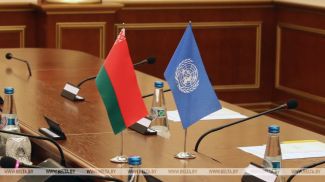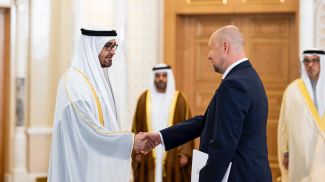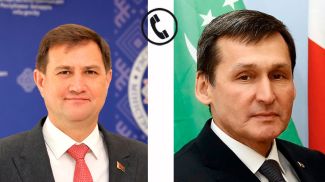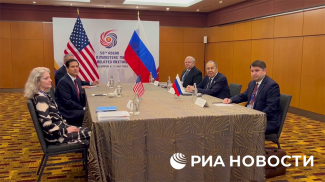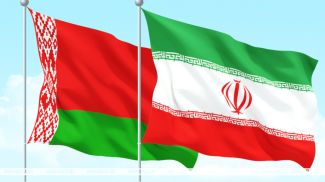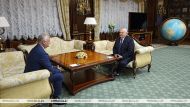
Belarus and Vietnam are consistently expanding comprehensive ties, including economic ones, based on mutual benefits. In March 2022, the Consulate General of the Republic of Belarus began operating in the Vietnamese Ho Chi Minh City. This has become a landmark event for the promotion of trade and economic cooperation between our country and the southern region of Vietnam. As the Consul General of Belarus in Ho Chi Minh City, Ruslan Varankou explained in an interview with a BelTA correspondent on the eve of Vietnam's Independence Day, the opening of the diplomatic mission has become a kind of a bridge between Belarusian and southern Vietnamese businesses. He discussed the reasons behind the decision to expand the Belarusian diplomatic presence in the southern region of Vietnam and emphasized the high potential of bilateral cooperation in trade, economic and other areas. Additionally, he highlighted specific aspects of Ho Chi Minh City's development.
Mr Varankou, in your opinion, what makes Ho Chi Minh City special, and why is it important for Belarus to have a diplomatic presence in this region?
To answer this question, it is necessary to dive into several interconnected contexts. The first concerns the traditionally friendly, close relations that connect Belarus and Vietnam. We remember the international assistance that the BSSR provided to the then Democratic Republic of Vietnam in the liberation of the south of the country from invaders and reunification into one state.
This also includes the training of Vietnamese specialists at Belarusian educational institutions, who subsequently contributed and continue to contribute to the development of Vietnam in all areas – from industry and agriculture to public administration and culture.
This assistance, as well as the valuable economic support for the young country that just broke free from colonial shackles, is well remembered and highly valued by the older and middle generations of Vietnamese. During my meetings, I frequently encounter individuals who warmly express gratitude to Belarus for assistance. This context makes us especially welcome in Vietnam. Moreover, given the current political pressure and sanctions imposed by Western countries, our closer cooperation with far-arc countries is taking on new significance. This strategic shift is aligned with the vision set forth by the Belarusian head of state.
The second crucial aspect is Vietnam’s geographical location. Its territory, comparable in size to Germany, Malaysia and Poland, stretches 1,750 kilometres from north to south. Remarkably, its narrowest width - from west to east - is a mere 48 kilometres. The political centre, the capital city of Hanoi, lies 1,137 kilometres away from the financial and industrial hub of the country - the Ho Chi Minh City agglomeration.
These circumstances create challenges for maintaining consistent communication between the Belarusian Embassy in Hanoi and government agencies and businesses in southern Vietnam. To address this, establishing a permanent diplomatic presence makes perfect sense. In our case, this gap was bridged by opening a consulate general.
The third, perhaps most critical aspect, revolves around the trade and economic potential of southern Vietnam. This region encompasses two of Vietnam’s four main economic areas: the Southern Key Economic Region and the Mekong Delta Key Economic Region. Together, they generate approximately 40% to the country's GDP.
It is essential to note that Vietnam has four key economic regions: northern, central, southern and the Mekong Delta Key Economic Region. The Consulate General’s location falls within the latter two.
The Southern Key Economic Region includes Ho Chi Minh City, Ba Ria-Vung Tau, Binh Duong, Binh Phuoc, Dong Nai, Long An, Tien Giang, and Tay Ninh provinces. Meanwhile, the Mekong Delta Key Economic Region encompasses Can Tho City, An Giang, Ca Mau, and Kien Giang provinces. Both of these southern key economic regions play pivotal roles in driving Vietnam's economy, collectively contributing over $160 billion – approximately 40% of the country’s GDP according to 2024 forecasts.
There are over 400 industrial parks in Vietnam, including four export processing zones, covering a total area of more than 89,000 hectares. Among these, the southern region stands out due to its significant number of industrial parks. Specifically, five key regions - Ho Chi Minh City, Dong Nai, Ba Ria-Vung Tau, Binh Duong, and Long An provinces - account for over half of this area, totalling approximately 45,000 hectares. Within these regions, more than 8,000 projects are currently underway, with a combined investment value exceeding $100 billion. Additionally, the southern region hosts ten of Vietnam’s 34 seaports. Given Belarus’ emphasis on economic diplomacy in the current context, this is the raison d'être for our Consulate General in Ho Chi Minh.
What can Belarus and Vietnam offer each other economically? What, in your opinion, are the most promising interaction strategies?
It is no secret that from the outset of our diplomatic presence in Vietnam, we saw that the economies of the two countries are complementary. What does this mean? Precisely the classic international division of labour, as understood by Adam Smith and David Ricardo: Belarus has extensive competencies in mechanical engineering, petrochemistry, food processing and production, creation of production clusters in the dairy and meat industries. Vietnam, for its part, is a major manufacturer of electronics, exports agricultural and marine products, has a developed marine and resort industry, which are inaccessible in Belarus due to its climatic and geographical features. Thus, we can meet each other’s needs without entering into direct competition.
Of course, this explanation strongly simplifies cooperation prospects between Belarus and Vietnam, and economic theory has evolved significantly since the time of the classical economists and now takes into account many more factors.
Mr Varankou, in your opinion, what makes Ho Chi Minh City special, and why is it important for Belarus to have a diplomatic presence in this region?
To answer this question, it is necessary to dive into several interconnected contexts. The first concerns the traditionally friendly, close relations that connect Belarus and Vietnam. We remember the international assistance that the BSSR provided to the then Democratic Republic of Vietnam in the liberation of the south of the country from invaders and reunification into one state.
This also includes the training of Vietnamese specialists at Belarusian educational institutions, who subsequently contributed and continue to contribute to the development of Vietnam in all areas – from industry and agriculture to public administration and culture.
This assistance, as well as the valuable economic support for the young country that just broke free from colonial shackles, is well remembered and highly valued by the older and middle generations of Vietnamese. During my meetings, I frequently encounter individuals who warmly express gratitude to Belarus for assistance. This context makes us especially welcome in Vietnam. Moreover, given the current political pressure and sanctions imposed by Western countries, our closer cooperation with far-arc countries is taking on new significance. This strategic shift is aligned with the vision set forth by the Belarusian head of state.
The second crucial aspect is Vietnam’s geographical location. Its territory, comparable in size to Germany, Malaysia and Poland, stretches 1,750 kilometres from north to south. Remarkably, its narrowest width - from west to east - is a mere 48 kilometres. The political centre, the capital city of Hanoi, lies 1,137 kilometres away from the financial and industrial hub of the country - the Ho Chi Minh City agglomeration.
These circumstances create challenges for maintaining consistent communication between the Belarusian Embassy in Hanoi and government agencies and businesses in southern Vietnam. To address this, establishing a permanent diplomatic presence makes perfect sense. In our case, this gap was bridged by opening a consulate general.
The third, perhaps most critical aspect, revolves around the trade and economic potential of southern Vietnam. This region encompasses two of Vietnam’s four main economic areas: the Southern Key Economic Region and the Mekong Delta Key Economic Region. Together, they generate approximately 40% to the country's GDP.
It is essential to note that Vietnam has four key economic regions: northern, central, southern and the Mekong Delta Key Economic Region. The Consulate General’s location falls within the latter two.
The Southern Key Economic Region includes Ho Chi Minh City, Ba Ria-Vung Tau, Binh Duong, Binh Phuoc, Dong Nai, Long An, Tien Giang, and Tay Ninh provinces. Meanwhile, the Mekong Delta Key Economic Region encompasses Can Tho City, An Giang, Ca Mau, and Kien Giang provinces. Both of these southern key economic regions play pivotal roles in driving Vietnam's economy, collectively contributing over $160 billion – approximately 40% of the country’s GDP according to 2024 forecasts.
There are over 400 industrial parks in Vietnam, including four export processing zones, covering a total area of more than 89,000 hectares. Among these, the southern region stands out due to its significant number of industrial parks. Specifically, five key regions - Ho Chi Minh City, Dong Nai, Ba Ria-Vung Tau, Binh Duong, and Long An provinces - account for over half of this area, totalling approximately 45,000 hectares. Within these regions, more than 8,000 projects are currently underway, with a combined investment value exceeding $100 billion. Additionally, the southern region hosts ten of Vietnam’s 34 seaports. Given Belarus’ emphasis on economic diplomacy in the current context, this is the raison d'être for our Consulate General in Ho Chi Minh.
What can Belarus and Vietnam offer each other economically? What, in your opinion, are the most promising interaction strategies?
It is no secret that from the outset of our diplomatic presence in Vietnam, we saw that the economies of the two countries are complementary. What does this mean? Precisely the classic international division of labour, as understood by Adam Smith and David Ricardo: Belarus has extensive competencies in mechanical engineering, petrochemistry, food processing and production, creation of production clusters in the dairy and meat industries. Vietnam, for its part, is a major manufacturer of electronics, exports agricultural and marine products, has a developed marine and resort industry, which are inaccessible in Belarus due to its climatic and geographical features. Thus, we can meet each other’s needs without entering into direct competition.
Of course, this explanation strongly simplifies cooperation prospects between Belarus and Vietnam, and economic theory has evolved significantly since the time of the classical economists and now takes into account many more factors.
However, our economic relations have progressed even further: in 2015, we established a comprehensive free trade agreement with Vietnam - the first document of its kind within the Eurasian Economic Union to regulate in detail economic cooperation with a third state. Notably, the European Union took four more years to conclude a similar agreement with Vietnam. This signals Vietnam’s special regard for the post-Soviet space in general and, specifically, for Belarus.
Returning to trade and economic cooperation and exploring its promising forms, we must recognize that Vietnam’s participation in 14 other free trade agreements creates favorable conditions for goods from countries that compete with us.
Belarus, like any other nation, strives to boost domestic production, establish its own manufacturing facilities to replace imports, enhance the skills of local personnel, and develop technological capabilities. Similarly, Vietnam aims to produce more science-intensive and high-tech products within its borders. Notable examples of such cooperation include factories operated by corporations like Intel, Microchip, Samsung, Kumho, Sanofi, Heineken, Lego, and Procter & Gamble, all located in the southern region of Vietnam.
Obviously, we should also use this toolkit more actively, especially with a view to creating joint production facilities that can be labelled "Made in Vietnam" or "Made in ASEAN". This is the form in which we see the greatest potential, allowing us to gain a solid foothold and reduce dependence on sporadic or one-time deliveries. Anchor projects of this nature will also attract other related Belarusian goods. For instance, in northern Vietnam, the MAZ truck assembly plant operates in the province of Hung Yen. In the south, we are working toward launching joint high-tech Belarusian-Vietnamese products. While active efforts are already underway in this direction, I prefer not to get ahead of myself at this stage.
Another avenue for our economic presence involves raising awareness about our enterprises and products. Conducting country-specific advertising or joint campaigns featuring Belarusian producers can highlight the exceptional quality of our goods. We are currently pursuing this path alongside Belarusian food and dairy enterprises. Additionally, we plan to collaborate with Vietnamese partners on marketing research to identify the most promising products for local retail chains.
I’d like to emphasize the importance of Belarusian manufacturers participating in specialized exhibitions and related B2B events held in Ho Chi Minh City. Vietnamese business culture places great value on personal interactions, considering them essential for successful business development.
Since February 2024, the consular district of the Consulate General has additionally included 16 provinces and a city of central governance. What are the prospects for the development of interregional cooperation between Belarus and these administrative units?
Starting in 2022, when the Consulate General began operating, cooperation between Minsk and Ho Chi Minh City significantly intensified. The foundation for this growth was the twinning agreement between the two cities. Notably, in both 2022 and 2023, the Deputy Chairperson and then the First Deputy Chairperson of the Minsk City Executive Committee visited Ho Chi Minh City. Importantly, these delegations consistently included representatives of significant enterprises in Minsk and across Belarus.
These visits seamlessly blend G2G, G2B and B2B formats. They allow us to identify new promising niches for our products in Vietnam and collaboratively address specific challenges that arise.
This year, we not only plan to hold a similar visit, but also to take our cooperation even further by organizing “Minsk Days” in Ho Chi Minh City. This event will feature an official component with the participation from the leadership of the two cities, an event for business associations and business circles of Belarus and Ho Chi Minh City, as well as a cultural program.
We aim to build our work with other provinces on a similar principle: to conclude interregional cooperation agreements as a proven mechanism for fostering direct dialogue between businesses. In this context, I see the role of the Consulate General not only to serve as a bridge between the regions in both countries, but also as a mind behind the intensified interaction, having the ability to identify common ground in the field. For instance, we are already working on establishing twinning relations between one of the regional centers of Belarus and the city of Vung Tau.
Given the current landscape, what are the prospects for the development of tourism relations between our countries?
The topic of tourism is given a special promise due to the fact that travel opportunities to visit European countries are effectively closed for our citizens and the spike in prices in traditional Belarusian holiday destinations like Egypt and Turkey.
The regions of southern Vietnam are a new, not yet beaten direction, hospitably welcoming our fellow citizens. With diverse natural landscapes, a consistent year-round climate, an extensive coastline, vibrant cuisine, and rich cultural experiences, it’s an ideal and captivating destination for Belarusian tourists.
Conversely, Belarus - with its lush green forests, serene lakes, winding rivers, and distinctive architecture - beckons Vietnamese travelers. Our unique culture and historical sites make Belarus an attractive tourist spot.
I am confident that the agreement on visa-free travel concluded between our countries and currently undergoing internal procedures necessary for its entry into force, will also contribute to the growth of tourist exchanges.
I am also convinced that increased tourist flows will positively impact business contacts between our nations.
In general, I’d like to emphasis that no areas or forms of interaction are insignificant. Each one plays a crucial role in bringing the peoples of Belarus and Vietnam closer together.
Alina GRISHKEVICH,
BelTA




